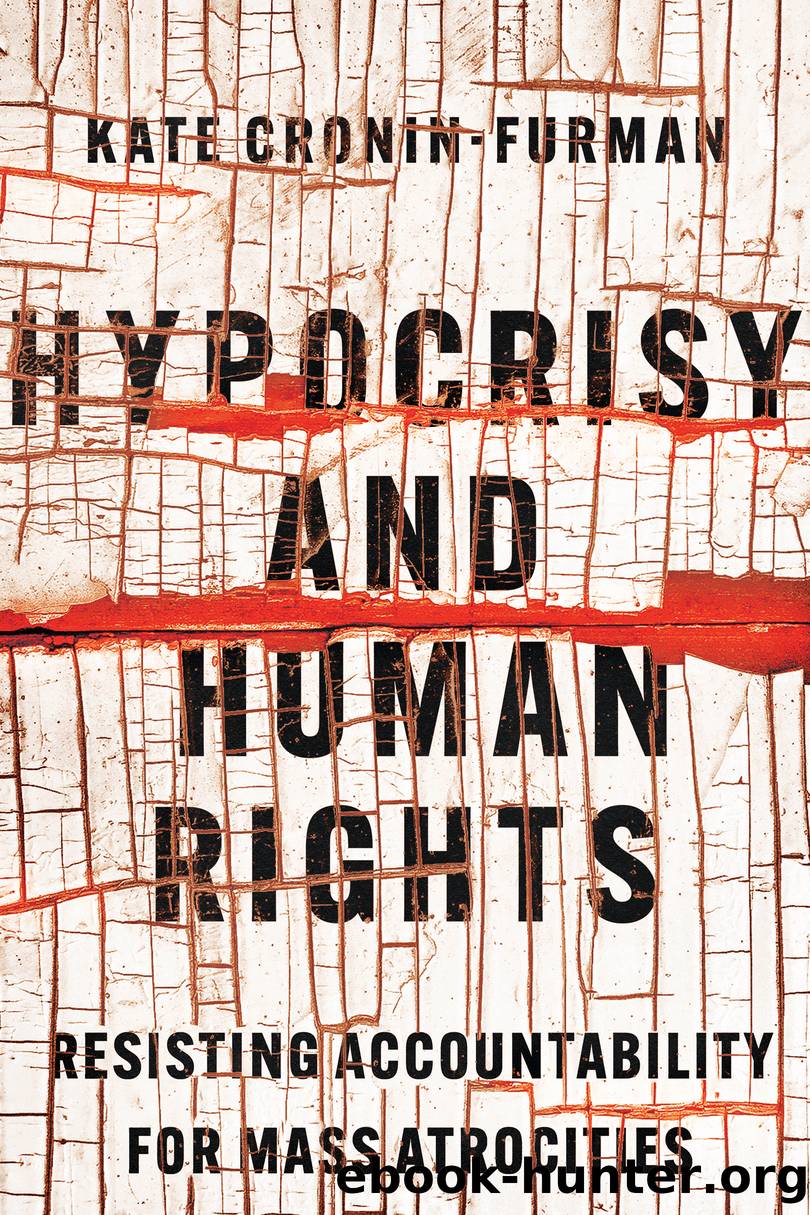Hypocrisy and Human Rights by Kate Cronin-Furman

Author:Kate Cronin-Furman
Language: eng
Format: epub, pdf
Publisher: Cornell University Press
This rapid legal response involves the coordination of evidence gathering, witness preparation, trial logistics, and publicity, all done with heavy involvement from international actors. The only piece of the process over which the Congolese judicial system retains exclusive authority is decision and sentencing.
The involved organizations have been present in the DRC for many years. For instance, one of the organizations I met with in 2014, Avocats sans Frontières (ASF) has been working on justice issues in eastern DRC since 2002. The American Bar Associationâs Rule of Law Initiative, another major sponsor of the mobile courts program, has been providing legal aid in the region since 2008. The United Nations is also heavily involved, both through the support of the United Nations Development Programme (UNDP) to the mobile courts and through the monitoring and capacity-building work of the Joint Human Rights Office, a cooperative endeavor between the MONUSCO peacekeeping mission and the Office of the High Commissioner for Human Rights established in 2008.14 These offices are heavily funded and staffed, providing jobs for hundreds of people (both locals and internationals).
Since 2009, with the assistance of these and other international actors, the Congolese military courts have convicted more than 250 individuals for international crimes.15 The majority of those who have been brought to trial have been low-ranking soldiers in the national army. This is partly due to the fact that responsibility for sexual violence crimes may be harder to assign when perpetrated by nonâstate actor armed groups who donât wear uniforms and lack a clear chain of command. But itâs also the result of reluctance on the part of prosecutors to charge nonâstate actors âfor fear that it will escalate tensions and lead to more violence.â16
Prosecutions of high-level military commanders have also been avoided due to the obvious political risk, as well as an additional procedural complication: Members of the FARDC may only be judged by their peers or superiors. Consequently, âsome of the highest-ranking officers may benefit from de facto immunity from prosecution because of the lack of military magistrates of equal or superior ranks.â17
The prosecutions of low-ranking army members that have been carried out have suffered from serious procedural shortcomings. The high-profile Minova case, which tried thirty-nine members of FARDC for mass rape, is illustrative of some of these issues. In November 2012, FARDC suffered a humiliating defeat at the hands of the M23 rebel group. Driven out of the provincial capital of Goma, they descended on the town of Minova. Over the course of two weeks, soldiers raped more than 130 women and girls, including children as young as six. When these crimes came to light, international actors exerted significant pressure to have the perpetrators brought to justice, in part because some of the troops implicated had been trained by the United States. An investigation began in December 2012.
When the Minova trial opened on November 20, 2013, it was heralded as a watershed moment in the fight against impunity for sexual violence. But the decision handed down on May 5, 2014, was deeply disappointing to victims and their advocates.
Download
Hypocrisy and Human Rights by Kate Cronin-Furman.pdf
This site does not store any files on its server. We only index and link to content provided by other sites. Please contact the content providers to delete copyright contents if any and email us, we'll remove relevant links or contents immediately.
The Pirates of Somalia by Jay Bahadur(1621)
Political Theology by Carl Schmitt(1577)
The Holocaust: A New History by Laurence Rees(1520)
The Social Animal by David Brooks(1451)
A Practical Guide to International Arbitration in London by Hilary Heilbron(1426)
Restitution by Restitution(1424)
Pirates of Somalia by Jay Bahadur(1376)
Coercing Virtue by Robert H. Bork(1356)
The Nuremberg Interviews by Leon Goldensohn(1302)
Basic International Corporate Taxation by Sebastiano Garufi(1213)
A History Of Thailand by Baker Chris(1187)
International Trade and Business: Law, Policy and Ethics by Gabriël Moens & Peter Gillies(1137)
The Global Commons by Susan J. Buck(1137)
The Sovereignty of Human Rights by Macklem Patrick(1113)
Blood Profits by Vanessa Neumann(1113)
Asian Waters by Humphrey Hawksley(1113)
Spring Fever: The Illusion of Islamic Democracy by McCarthy Andrew C(1096)
The Nuremberg Trials: The Nazis and their Crimes Against Humanity by Roland Paul(1043)
Crimes Against Humanity: Historical Evolution and Contemporary Application by M. Cherif Bassiouni(1020)
